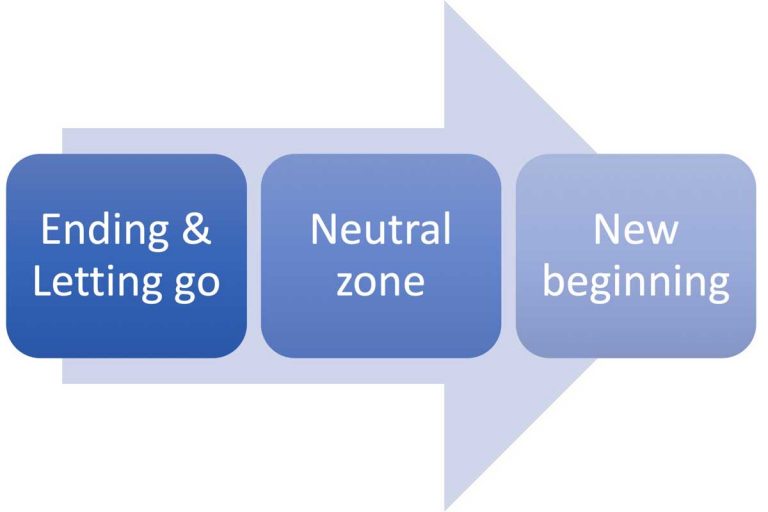
Статьи
Transition mentoring to enable your employees to thrive in a pandemic
By Lis Merrick
 A quarter of the world’s population is now in lockdown. Lis Merrick explores the situation and offers a perspective on what employers can do in this extraordinary chaos. Exploring mentoring through the lens of William Bridges’ Model of Managing Transitions1, she proposes the greatest gift an employer can give at this time is a mentor to support through these incredulous changes in our lives caused by the Covid-19 virus.
A quarter of the world’s population is now in lockdown. Lis Merrick explores the situation and offers a perspective on what employers can do in this extraordinary chaos. Exploring mentoring through the lens of William Bridges’ Model of Managing Transitions1, she proposes the greatest gift an employer can give at this time is a mentor to support through these incredulous changes in our lives caused by the Covid-19 virus.
Over two billion people are anxious, stressed by working from home, or working and fearful of contact with infected colleagues. They are frustrated and bored by the lockdown, or irritated by children who are fed up and the majority are worried about elderly friends and relatives. Some people are not allowed out for exercise, many cooped up in small flats or without a garden. So many of us are not able to physically see loved ones. Plus we have the anxiety of the news and ‘fake news’, which worsens day by day as the pandemic unfolds.
So how can we help people in the workplace in this Covid-19 turmoil? I believe Transition Mentoring is the most powerful intervention that will support individuals through the process of adjusting and recalibrating their mindset in this pandemic. Mentoring will create the reflective space and create individual and organisational innovative solutions to cope more effectively. These ideas will enable your workforce to think about how they are going to change going forward. How to live in a society with tough restrictions on social contact and movement. Mentoring won’t solve the personal impact felt by the pandemic lockdown, but it will support the growth of adaptive capacity in your people to overcome the issues experienced.
A seismic shift in societal, economic and cultural existence
 Transition mentoring when there is uncertainty aheadI don’t think anyone has missed the news recently. It unfolds daily like the story from a sci-fi film. The world has changed beyond all recognition in a few weeks and in just one week for us in the UK. Two days ago we all had a text message from the Government to tell us to stay at home. Although this ‘directive’ is to be reviewed in three weeks, there is no evidence that we will be able to lift the lockdown then. Without a vaccine in sight, there appears to be little hope of being able to develop the ‘herd immunity’ that the UK Government discussed as the way forward only last week. Instead, periods of complete lockdown, interspersed with some relaxation in the rules, is most probably going to be our new medium-term existence.
Transition mentoring when there is uncertainty aheadI don’t think anyone has missed the news recently. It unfolds daily like the story from a sci-fi film. The world has changed beyond all recognition in a few weeks and in just one week for us in the UK. Two days ago we all had a text message from the Government to tell us to stay at home. Although this ‘directive’ is to be reviewed in three weeks, there is no evidence that we will be able to lift the lockdown then. Without a vaccine in sight, there appears to be little hope of being able to develop the ‘herd immunity’ that the UK Government discussed as the way forward only last week. Instead, periods of complete lockdown, interspersed with some relaxation in the rules, is most probably going to be our new medium-term existence.
It appears that we are entering a new phase of societal, economic and cultural existence. A phase where regular lockdowns are the norm. Human beings will need to find a new way of not just surviving but thriving in this strange new world of physical isolation from others and reliance on technology to communicate.
General advice about working from home
There is a plethora of advice and articles aimed at helping people to work from home:
- Don’t forget to get dressed (bottom half as well as top!),
- Have a daily routine,
- Get up and move around,
- Don’t get overloaded with the news,
- Keep your workspace tidy,
- Eat healthily (and hide the biscuit tin!)
- Stop the dog barking during calls,
- Connect with your work colleagues etc.
This information is not new. Many people like me now work from home regularly, are comfortable with virtual meetings and may work as part of a global virtual team. What is different is that this is now a totally virtual existence for many. To add to the isolation, they may be locked down with just their immediate family or could be on their own. Plus, there is no physical social outlet to their lives and many are also not able to leave their homes, apart from exercising and vital food shopping trips.
How can employers help during this pandemic lockdown?
This is an opportunity for people to learn and study. Many organisations offer virtual study programmes and courses to help with development. This is a great idea and in fact offering accelerated virtual coaching and mentoring programmes is a bandwagon I have also jumped on. However, you need to be motivated to study, you need to have the energy to learn. What this pandemic has created is a general malaise of low energy and fear. Covid-19 has a real mental zapping quality and that is before you even catch it! It is really difficult to start learning something new, or applying yourself to a course when you are worried sick about your elderly relatives, friends, the economy and whether you might still have a job next month.
Transition Mentoring to move to a new beginning
However, what I believe individuals really need in this quite ‘alien’ new world, is to be able to access someone impartial to talk to, a sounding board, a ‘safe space’ where they can air their fears and concerns. Someone who is not their manager or a peer in their own team, but an individual who works for the same organisation and can mentor them through the transitions everyone in virus infected countries are going through.
A mentor who is familiar with good coping strategies for mental and physical self-care William Bridges’ Model of Managing Transitions can be a powerful influence in supporting your employees through the phases of transition:
- Letting go of our old work and life style,
- Entering the neutral zone of uncertainty and discomfort and
- Helping to create a new beginning.
This support will be essential as we emerge into what life is going to look like in the next few years with Covid-19 impacting everything on this planet. So let us explore each stage of transition everyone will need to move through.

Letting go
Already we are all grieving what we are missing. No talking to colleagues at the coffee machine, going to the pub, social events, shopping trips, the list is long of what lockdown means in practice. Acknowledging that loss and supporting the acceptance of what short term life will look like and how it may emerge longer term is comforting. Career opportunities, job promotions, conferences, face to face interactions, so much is on hold or will be reduced with global recession and most probably a continuing series of lockdowns. There are so many endings we all need to face up to, to let go of the past and to practise acceptance of our current reality for the time being.
Neutral zone
Moving from this place of ‘ending’ and ‘letting go’ and allowing a period of temporary flux, experimentation, innovation in coping mechanisms, embracing the losses but being motivated to try out new ways of working, socialising and working in isolation, keeping fit – mentally and physically, is all easier with someone to support you, to listen to you, to perhaps provide advice, or to use as a sounding board. A mentor will help to prevent your employees throwing the cat at their partner, reduces mental catastrophizing, provides an outlet for anxiety and resentment. It creates that reflective space for individuals to make sense of their ‘now’ and to develop solutions that work for them and the organisation.
Moving from this place of ‘ending’ and ‘letting go’ allows:
- A period of temporary flux,
- Time for experimentation,
- Innovation in coping mechanisms,
- Embracing the losses but being motivated to try out new ways of working,
- Socialising virtually and working in isolation,
- Focussing on keeping fit – mentally and physically.
Navigating the neutral zone is easier with someone to support you, to listen to you, to perhaps provide advice, or to use as a sounding board. A mentor will help to prevent your employees throwing the cat at their partner, reduces mental catastrophizing, provides an outlet for anxiety and resentment. It creates that reflective space for individuals to make sense of their ‘now’ and to develop solutions that work for them and the organisation.
New beginning
With the devastating impact of Covid-19, this is where everyone needs support to move to. Developing new ideas for living and working, creating fresh energy and a renewed sense of purpose in what is going to be a completely different way of being, unless a vaccine is developed and administered very quickly, which sadly does not appear to be on the cards. Mentors can help to create that consistency, challenge and feedback in someone’s life, to celebrate small successes in the way the mentee is managing this new existence and their changing mindset, to highlight and feedback to their mentee what they are hearing and their reality of the situation and to support the creation of a new vision and plan for thriving through this virus chaos.
Transition Mentoring is the way forward
I believe the greatest gift an organisation can give to their employees at this time (after the pay and rations piece!) is the support of a mentor.
A mentor who understands how to support through these critical phases of transition, who can encourage adaptive capacity and encourage their mentee to thrive at this time, not just survive till we are through the virus, if we get through it. Many experts are talking about the virus continuing to mutate and bounce back once lockdown strategies are relaxed, so waiting for an all clear is not an option. Of course, the mentors themselves will get so much from these relationships also. Many of the conversations will uncover similar challenges and dilemmas in the mentor’s own life, enabling them to benefit from this shared reflective space and learn from the conversations with their mentees. Introducing mentors to techniques to support these dialogues and develop in a Covid-19 environment will also boost their own repertoire of resilience building skills.
I am offering this perspective in the spirit of helpfulness at this time. Do come and talk to me (virtually of course!) if you would like some help in setting up some transition mentoring to enable your employees to thrive during this pandemic.
© 2015-2021 IBLF Russia. Все права защищены.

